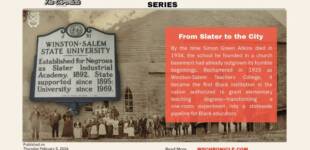County, state lawmakers meet on legislative goals
BY TODD LUCK
THE CHRONICLE
Frictions between urban and rural counties and between cities and counties were at the forefront when county commissioners met with state lawmakers on Thursday, Jan 5.
Forsyth County commissioners meet with the local legislative delegation before each session to discuss legislative goals. The state lawmakers in attendance were Sen. Paul Lowe, Rep. Ed Hanes, Rep. Evelyn Terry, Rep. Julia Howard and Rep. Debra Conrad.
Several lawmakers remarked about the legislative struggle between rural and urban counties for distribution of state tax money.
“You better buckle up, because the state is run by the rural counties and the rural centers,” said Hanes.
Hanes said that rural lawmakers are often unreceptive to issues in urban counties because they have their own host of problems. He said that became evident on the repeal of HB 2, when rural lawmakers –including some Democrats – didn’t support repeal. HB 2 is considered by many to be a discriminatory state law and has resulted in businesses boycotting North Carolina, which has been felt in urban counties. Lawmakers are expected to try to repeal it again after failing to do so during a special session last month.
Commissioners once again included a stormwater fee exemption for counties in their requests to lawmakers, which Commissioner Walter Marshall voiced concerns about because of its potential environmental impact. Winston-Salem is one of many cities that charges fees on impervious surfaces like roofs and parking lots to fund programs to prevent stormwater pollution, which are federally mandated in larger cities.
The city and county were at odds last year over fees the Smith Reynolds Airport had to pay. The county was considering de-annexing the airport to avoid the fees until it came to an agreement where both the city and county would give the airport money for capital development. The local school system, which is under the county, paid $233,391 in stormwater fees in 2015, which is the highest in the city.
Hanes and Lowe both said that stormwater fees is a matter that needs to be worked out on a local level.
“You do not want to bring that to Raleigh because you don’t know what it’s going to be,” said Lowe.
Commissioner Ted Kaplan proposed starting small by simply giving runways and taxiways at airports the same exemption from the fees that roads are given. Conrad thought that might be an appealing idea to her colleges and said she’d work with him on it.
When The Chronicle contacted the city for its position on the proposal, Assistant City Manager Greg Turner said the city doesn’t support an exemption for runways and taxiways.
Other requests by the county included public policy initiatives supporting the airport, increasing court facilities fees to help with the cost of a new or renovated courthouse, not legislating county tax appraisal standards and various measures to clarify county authority.
County Commissioner Chair Dave Plyler said he’d like to see the historic tax credit restored to the level it was before 2015. There were also discussions about challenges with educational funding. Hanes lamented that there are local schools that are “failing” and not meeting state standards.
“It’s our fault, because it’s about our lack of care for people and about our lack of care for poor people, in general,” said Hanes
Howard cautioned commissioners and her colleagues to temper their expectations in education and other areas.









